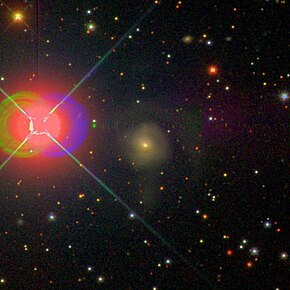IC 1327 is lenticular galaxy of type S0-a,[1] located in the constellation Aquila. Its redshift is 0.032386,[2] which corresponds IC 1327 to be located 445 million light-years from Earth.[3] It has an apparent dimension of 0.90 x 0.8 arcmin, meaning the galaxy is 117,000 light-years across.[4] IC 1327 was discovered on August 10, 1890, by Sherburne Wesley Burnham.[5]
| IC 1327 | |
|---|---|
 Image of IC 1327 captured through SDSS | |
| Observation data (J2000 epoch) | |
| Constellation | Aquila |
| Right ascension | 20h 35m 41.27s |
| Declination | -00d 00m 20.8s |
| Redshift | 0.032386 |
| Heliocentric radial velocity | 9,709 km/s |
| Distance | 445 Mly (136.4 Mpc) |
| Apparent magnitude (V) | 14.0 |
| Apparent magnitude (B) | 14.9 |
| Surface brightness | 13.5 |
| Characteristics | |
| Type | S0^+?, AGN?, S0-a |
| Apparent size (V) | 0.90' x 0.8' |
| Other designations | |
| PGC 65027, KIG 0881, CGCG 373-038, IRAS 20331-0010, NVSS J203541-000020 | |
According to a study conducted in April 2006, IC 1327 is considered an isolated galaxy, which is included in early-type E-S0 galaxies that make up 14% of the isolated sample of galaxies in the local universe.[6] Moreover, IC 1327 contains X-ray emission within a distance of 100 arcsec from the infrared position, which its structure is inspected in overlays on optical images.[7]
References
edit- ^ "HyperLeda -object description". atlas.obs-hp.fr. Retrieved 2024-05-15.
- ^ "IC 1327 - lenticular galaxy. Description IC 1327". kosmoved.ru. Retrieved 2024-05-15.
- ^ "Your NED Search Results". ned.ipac.caltech.edu. Retrieved 2024-05-15.
- ^ "Revised IC Data for IC 1327". spider.seds.org. Retrieved 2024-05-15.
- ^ "Index Catalog Objects: IC 1300 - 1349". cseligman.com. Retrieved 2024-05-15.
- ^ Sulentic, J. W.; Verdes-Montenegro, L.; Bergond, G.; Lisenfeld, U.; Durbala, A.; Espada, D.; Garcia, E.; Leon, S.; Sabater, J.; Verley, S.; Casanova, V.; Sota, A. (2006-04-01). "The AMIGA sample of isolated galaxies. II. Morphological refinement". Astronomy and Astrophysics. 449 (3): 937–949. arXiv:astro-ph/0610784. Bibcode:2006A&A...449..937S. doi:10.1051/0004-6361:20054020. ISSN 0004-6361.
- ^ Boller, Th.; Bertoldi, F.; Dennefeld, M.; Voges, W. (1998-04-01). "ROSAT All-Sky Survey observations of IRAS galaxies. I. Soft X-ray and far-infrared properties". Astronomy and Astrophysics Supplement Series. 129: 87–145. arXiv:astro-ph/9710177. Bibcode:1998A&AS..129...87B. doi:10.1051/aas:1998397. ISSN 0365-0138.